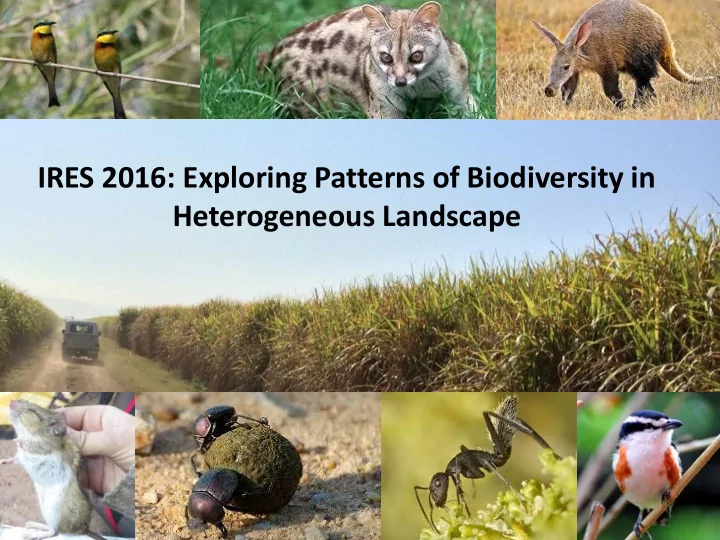

IRES 2016: Exploring Patterns of Biodiversity in Heterogeneous Landscape
International Research Experience for Students UNIVERSITY OF SWAZILAND
Balancing Biodiversity and Agriculture Is heterogeneity the answer?
Heterogeneity Hypothesis High What about biodiversity & landscape heterogeneity? Biodiversity Low
Components of Landscape Heterogeneity Low Composition Low Composition Low Configuration High Configuration High Composition High Composition Low Configuration High Configuration Fahrig et al . 2011
Objectives 1. Fine or Broad Scale 2. Landscape composition or configuration
Testing the landscape heterogeneity hypothesis Low Composition Low Configuration 2 km High Composition Low Configuration Agriculture High Composition Riparian/Forest High Configuration Closed savanna Communal lands Open savanna Water
Testing the landscape heterogeneity hypothesis Low Composition Low Configuration 2 km 15 Study Sites ! ! ! High Composition ! ! Low Configuration ! ! ! ! ! ! Agriculture ! High Composition Riparian/Forest High Configuration Closed savanna ! ! Communal lands Open savanna ! Water !
Biodiversity sampling across multiple taxonomic groups 500 m 50 m
Vegetation structural heterogeneity The alternative or complementary hypothesis for explaining patterns of diversity Tree height & Cover Shrub cover Grass biomass
Landscapes of biodiversity
• Indicators of environmental disturbance (Cole et al. 2002 ) • Respond rapidly to environmental change (Murphy et al. 1990) • Correlate strongly with vertebrate and invertebrate diversity (Pearson and Cassola 1992)
Land Use, Vegetation, and Beetle Diversity: What are the questions to ask? Vegetation: Land Use: - Land use types - Average Structure - Configuration - Structure Variance - Scale - Scale https://www.illovosugar.co.za/UserContent/images/News-Articles/Pg26b.png By ProfessorX. - Own work. Uploaded by ProfessorX, Public Domain, https://commons.wikimedia.org/w/index.php?curid=282227
Study Methods: Aerial View 75 plots, 9 traps per plot - - Beetles sorted by plot and by morphospecies - 4 traps with meat, 5 traps without Dun Beetle Trap: Massimiliano Bisceglie and Yen Yi Tan
Total Findings: 69 of 75 plots had at least 1 beetle 1687 beetles representing 43 species were captured Morphospecies 2 was the most common beetle (n = 709) Six species had only 1 beetle, Maximum beetles per plot: 105 and 23 had under 10 beetles Maximum of one species: 89
Results: Land Use Impacts on Species Richness - Vegetation negligible - Configuration negligible Important: Land use types - Amount of agriculture - Amount of savanna within 2km of the site within 2km of the site Within 2km Within 2km
- No dung in agriculture - Potential effects from pesticides - Inability to move through large patches of agriculture - Displays the need for large reserves, distance from agriculture to maintain biodiversity
Avian Responses to Landscape Heterogeneity Alison Ke, UC Berkeley alisonke@berkeley.edu
Why study birds? • Diverse • Sensitive to the environment • Mobile White-bellied Sunbird Red-faced Mousebird Dark-capped Bulbul
Does landscape heterogeneity drive bird species diversity? Prediction: Yes Alternative: Land-use drives bird diversity
Sampling Birds
After 320 point counts: 2755 individuals 83 species – 4 endemic – 2 near-endemic
Species Diversity Landscape composition drives diversity Land Cover Diversity Species Diversity Land-use drives diversity Proportion of Agriculture
✓ Habitat Heterogeneity Hypothesis Hypothesis ✓ Land-use
Take Home Landscape scale response Effect of agriculture Species Diversity ? .25 Proportion of Agriculture
Species Response to Heterogeneity at Different Scales Celine Carneiro IRES 2016
Focal Species Black-backed Jackal Large-spotted Genet 15 – 20 km 2 2 – 5 km 2
What scale of heterogeneity is most influential on occurrence? • Predictions: 1) Landscape-level heterogeneity Jackal presence edge agriculture 2) Fine-scale heterogeneity Genet presence canopy cover and shrub cover
Sampling • 1 baited camera, 2 unbaited cameras
Results • 14 out of 15 grids • 42 out of 75 plots • 7 out of 15 grids • 13 out of 75 plots
Large-spotted Genet Black-backed Jackal 5.8 3.5 5.7 3 5.6 2.5 5.5 2 5.4 Patch Cohesion 1.5 Grass biomass 5.3 1 5.2 0.5 5.1 5 0 Present Absent Present Absent
What does it mean? Species respond to heterogeneity at different scales
Small Mammal Diversity in the Lowveld of Swaziland University of Florida Savanna Research Center Nicole Jennings
Introduction Small mammals are useful for studying habitat heterogeneity. - Important ecological roles - Indicators of biodiversity - Highly mobile - Short generation times Gerbilliscus leucogaster (Bush Veld Gerbil) Saccostomus campestris (Pouched Mouse)
Questions & Predictions How is diversity affected by vegetation structure at the fine scale? Prediction: grass biomass and shrub cover is most influential Is diversity affected at the broad scale? Steatomys pratensis (Fat mouse) Prediction: different land cover types influence diversity
Methods • 5 plots per grid • 20 Sherman traps per plot • 4 trap nights per grid • Measurements • Ear tagging
Summary Statistics Abundance of Each Species 20 19 Total of 7,200 trap nights 18 Number of Individuals 16 14 52 individuals captured 12 11 10 10 Low sample size 8 6 6 4 4 1 1 2 Drought effects 0 Species Name
Results Species Richness Change to Variance in Increase in variance of Canopy Cover 3.5 canopy cover increase in species diversity 3 Why? 2.5 Species Richness 2 Species diversity not 1.5 affected at landscape scale 1 0.5 0 0 500 1000 1500 2000 2500 Variation in Canopy Cover
Take Home Message Grid Level Example Heterogeneity is an important factor for small mammal diversity - Why at these scales? Low sample size Drought 1 = Highest canopy layer diversity ; species diversity 5 = Lowest canopy layer diversity; species diversity
Fine scale vs broad scale heterogeneity? Fine Broad Beetles Carnivores Rodents Ants Birds Different taxa respond at different scales
Landscape compositional vs configurational heterogeneity? - - + Comp + Config + Beetles Carnivores Rodents Ants Birds Compositional heterogeneity most influential, but again varied responses
IRES in the future: 2017 & 2018
IRES 2016 “Very educational and amazing experience ” “ Put me ahead in accomplishing my goals as an ecologist”
Thank you and Questions? UNIVERSITY OF SWAZILAND Enthusiastic field crews! Max & Yinny for photos!
Recommend
More recommend